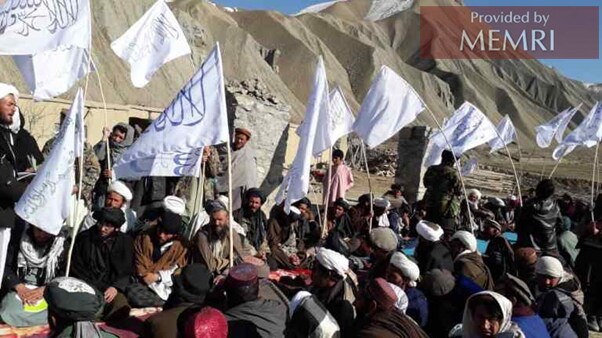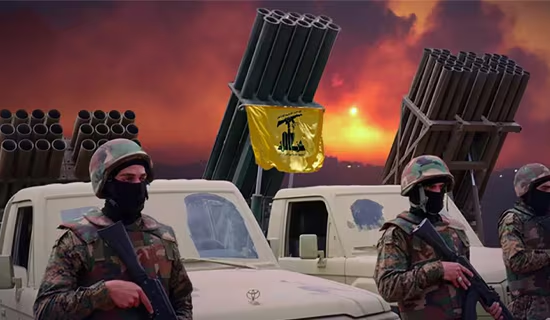
Zalmay Khalilzad (left) and Mullah Baradar Akhund sign the agreement in Doha.
Introduction
On February 29, 2020, the United States and the Islamic Emirate of Afghanistan (IEA, or the Taliban organization) signed an agreement on the future of Afghanistan that is threatening to blow up in the faces of the U.S. and its allies. Zalmay Khalilzad, U.S. special representative for Afghanistan reconciliation, and Mullah Abdul Ghani Baradar Akhund, the Islamic Emirate's deputy emir for political affairs and chief of its Political Office in Doha, signed the agreement, whose key points are included in this report, at a ceremony in the Qatari capital.
The Afghan Taliban consider the agreement mainly to be a "Termination of Occupation" instrument. The document signed by the two sides is titled "Agreement for Bringing Peace to Afghanistan Between the Islamic Emirate of Afghanistan Which is Not Recognized by the United States as a State And is Known as the Taliban, And the United States of America."[1] The Islamic Emirate issued a statement in which it dubbed the pact the "Termination of Occupation Agreement Between the Islamic Emirate and U.S."[2]
The Taliban Order Resumption Of Attacks On Afghan Forces
Now, the agreement threatens to fall apart. On March 1, a day after it was inked, Ashraf Ghani, the recently re-elected president of Afghanistan, went to the press and declared: There is no "precondition" to free 5,000 Taliban prisoners for the Islamic Emirate to begin the intra-Afghan talks, as proposed in the agreement; a deal "that is signed behind closed doors will have basic problems in its implementation"; and "the release of prisoners is not the United States authority, but it is the authority of the government of Afghanistan."[3]
Ghani's position is apparently based on a phone conversation with President Trump, who, he said, called him on March 1 to congratulate him on the agreement.[4] Ghani said in an interview with CNN: "President Trump is not asking me to release these people. We have not made a commitment to release them. It's a sovereign Afghan decision... We made it very clear to Ambassador Khalilzad that the political capital and the consensus in the country that would be necessary for such a major step does not exist today."[5] The White House did not publish any record of this conversation between President Trump and President Ghani.
Also on March 1, Zabihullah Mujahid, spokesman of the Islamic Emirate, said that the deal will not go ahead unless the 5,000 prisoners are released.[6] On March 3, Zabihullah Mujahid tweeted a translation of a tweet from Suhail Shaheen, the spokesman of the Islamic Emirate's Political Office in Doha, saying that the Taliban will meet with Afghan government officials "about 6,000 prisoner release procedure before start of intra-Afghan negotiations," meaning that the release of the prisoners is a precondition for the negotiations.[7] On March 3, the Islamic Emirate issued an unconfirmed "letter tell fighters to resume attacks on Afghan government forces, but exempt U.S. forces."[8]
Soon after the signature, the agreement had attracted criticism. To fend off criticisms from U.S. Congressmen, U.S. Secretary Of State Mike Pompeo told CBS News on March 1 that along with the public document, "there are two implementing elements that will be provided [to U.S. Congressmen]. They are secret."[9]
Mike Pompeo added: "They're classified, secret. There aren't any side deals."[10] So, there are two documents: One is public and the other is secret. However, the fact is that the agreement, which is publicly available, threatens to fall apart before March 10, 2020, the first day by which the Taliban are expected to "start" the intra-Afghan talks.

Zalmay Khalilzad sits with Taliban leaders in Doha during President Trump's telephone call.
President Trump And Qatar's Emir In Emergency Telephone Calls To Save Agreement
Worried that the agreement would collapse, President Donald Trump telephoned Taliban Deputy Emir For Political Affairs Akhund on March 3. During the 35-minute telephone call, President Trump told Akhund: "It is a pleasure to talk to you. You are a tough people and have a great country... My Secretary of State [Mike Pompeo] shall soon talk with Ashraf Ghani in order to remove all hurdles facing the intra-Afghan negotiations."[11]
According to a statement published on a Taliban website, Akhund told President Trump, in what amounts to a threat to the U.S.: "The Islamic Emirate... is a strong political and military force... If the United States honors the Agreement concluded with us then we will have positive future bilateral relations... National sovereignty and establishing a government of our own choosing in our homeland is the legitimate right of Afghans; therefore terms of the agreement must immediately be implemented."[12]
Also on March 3, Sheikh Tamim bin Hamad Aal Thani, the emir of Qatar who played a major role in the agreement and whose family's role in the 9/11 attacks and support of jihadi organizations is extensively documented, was pressed to intervene on an urgent basis to prevent the rapid disintegration of the U.S.-Taliban Agreement.[13] Full details of the Qatari emir's telephone conversation are not public. However, according to an Afghan media report, Sheikh Tamim Aal Thani told President Ghani that "he and his country [i.e., Qatar] are ready to help facilitate the Afghan peace process."[14]
According to the report, Sheikh Tamim Aal Thani said: "The new realities of Afghanistan are that the country now has an elected legitimate government and the Taliban must accept that" and "of course, the Taliban also" have "demands that will be discussed during the negotiations."[15]
The Obligations On The Part Of The U.S., Its Allies And The Coalition
Following are the main points and timeline of the agreement, which was written in English, Pashtu and Dari, identified as obligations on the part of the U.S., its allies, and the Coalition on the one hand and the Islamic Emirate on the other:[16]
-
Within 14 months: The U.S. is "committed to withdraw" all foreign forces including "all non-diplomatic civilian personnel, private security contractors, trainers, advisors, and supporting services personnel."
-
In the first 135 days (4.5 months) of 14 months: The U.S. will "reduce" the number of U.S. troops to 8,600 and "proportionally bring reduction" in the number of allied troops; and the U.S., its allies and coalition partners "will withdraw all their forces from five (5) military bases."
-
Within the remaining 9.5 months of 14 months: Along "with the commitment and action on the obligations of the Islamic Emirate" – the U.S., its allies, and the Coalition "will complete withdrawal of all remaining forces"; and the U.S., its allies, and the Coalition "will withdraw all their forces from remaining bases."
-
By March 10, 2020: The U.S. "is committed to start immediately to work with all relevant sides" to release combat and political prisoners. Up to 5,000 Taliban prisoners and up to 1,000 prisoners of the other side "will be released by March 10, 2020."
-
March 10, 2020: It will be "the first day of intra-Afghan negotiations" following the prisoner swap between the two sides.
-
For three months after March 10, 2020: "The relevant sides have the goal of releasing all the remaining prisoners over the course of the subsequent three months. The United States commits to completing this goal" and the Islamic Emirate "commits that its released prisoners will be committed to the responsibilities mentioned" so that they will not pose a threat to the security of the United States and its allies."
-
By August 27, 2020: "With the start of intra-Afghan negotiations, the United States will initiate an administrative review of current U.S. sanctions and the rewards list" against the Taliban members "with the goal of removing these sanctions by August 27, 2020."
-
By May 29, 2020: "With the start of intra-Afghan negotiations, the United States will start diplomatic engagement with other members of the United Nations Security Council and Afghanistan "to remove" Taliban leaders "from the sanctions list with the aim of achieving this objective by May 29, 2020."
-
The U.S. and its allies "will refrain from the threat or the use of force against the territorial integrity or political independence of Afghanistan or intervening in its domestic affairs."
-
The United States "will request the recognition and endorsement of the United Nations Security Council" for this Agreement.
-
The U.S. "will seek economic cooperation for reconstruction with the new post-settlement Afghan Islamic government as determined by the intra-Afghan dialogue and negotiations, and will not intervene in its internal affairs."

Afghan Taliban terrorists celebrate the signing of the agreement.
The Obligations On The Part Of The Islamic Emirate
-
The Islamic Emirate "will not allow any of its members, other individuals or groups, including Al-Qaeda, to use the soil of Afghanistan to threaten the security of the United States and its allies."
-
The Islamic Emirate "will send a clear message that those who pose a threat to the security of the United States and its allies have no place in Afghanistan" and "will instruct members of the Islamic Emirate... not to cooperate with groups or individuals threatening the security of the United States and its allies."
-
The Islamic Emirate "will prevent any group or individual in Afghanistan from threatening the security of the United States and its allies, and will prevent them from recruiting, training, and fundraising and will not host them."
-
The Islamic Emirate "is committed to deal with those seeking asylum or residence in Afghanistan according to international migration law and the commitments of this agreement, so that such persons do not pose a threat to the security of the United States and its allies."
-
The Islamic Emirate "will not provide visas, passports, travel permits, or other legal documents to those who pose a threat to the security of the United States and its allies to enter Afghanistan."
-
The Islamic Emirate "will start intra-Afghan negotiations with Afghan sides on March 10, 2020."
-
"A permanent and comprehensive ceasefire will be an item on the agenda of the intra-Afghan dialogue and negotiations."
-
The "obligations" of the Islamic Emirate "apply in areas under their control until the formation of the new post-settlement Afghan Islamic government as determined by the intra-Afghan dialogue and negotiations."[17]
-
The U.S. and the Islamic Emirate "seek positive relations with each other and expect that the relations between the United States and the new post-settlement Afghan Islamic government as determined by the intra-Afghan dialogue... will be positive."
*Tufail Ahmad is Senior Fellow for the MEMRI Islamism and Counter-Radicalization Initiative. Yigal Carmon is President of MEMRI.
[1] Khaama.com (Afghanistan), February 29, 2020.
[2] AlemarahEnglish.com (Afghanistan), March 2, 2020.
[3] ToloNews.com (Afghanistan), March 1, 2020.
[4] Twitter.com/ashrafghani/status/1234154531920994304, March 1, 2020.
[5] Transcripts.cnn.com/TRANSCRIPTS/2003/01/fzgps.01.html, March 1, 2020.
[6] ToloNews.com (Afghanistan), March 3, 2020.
[7] Twitter.com/Zabehulah_M33, March 3, 2020.
[8] ToloNews.com (Afghanistan), March 3, 2020.
[9] ToloNews.com (Afghanistan), March 2, 2020.
[10] ToloNews.com (Afghanistan), March 2, 2020.
[11] AlemarahEnglish.com (Afghanistan), March 3, 2020.
[12] AlemarahEnglish.com (Afghanistan), March 3, 2020
[13] MEMRI Inquiry & Analysis Series No. 1485, Qatar's Role In 9/11 And Hosting Jihadi Commanders; Afghan Taliban's Hideouts Move To Safe Haven Of Doha, November 19, 2019.
[14] ToloNews.com (Afghanistan), March 3, 2020.
[15] ToloNews.com (Afghanistan), March 3, 2020.
[16] Khaama.com (Afghanistan), February 29, 2020.
[17] Khaama.com (Afghanistan), February 29, 2020.




